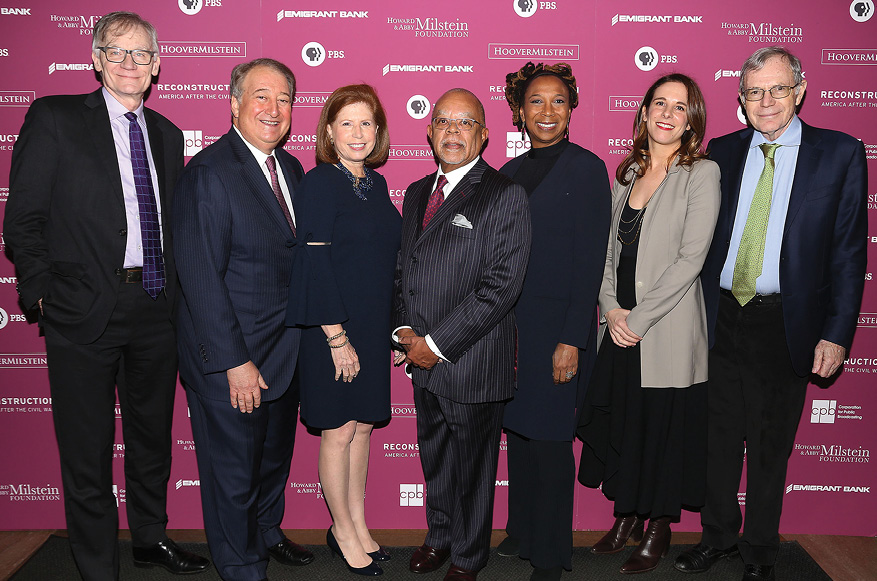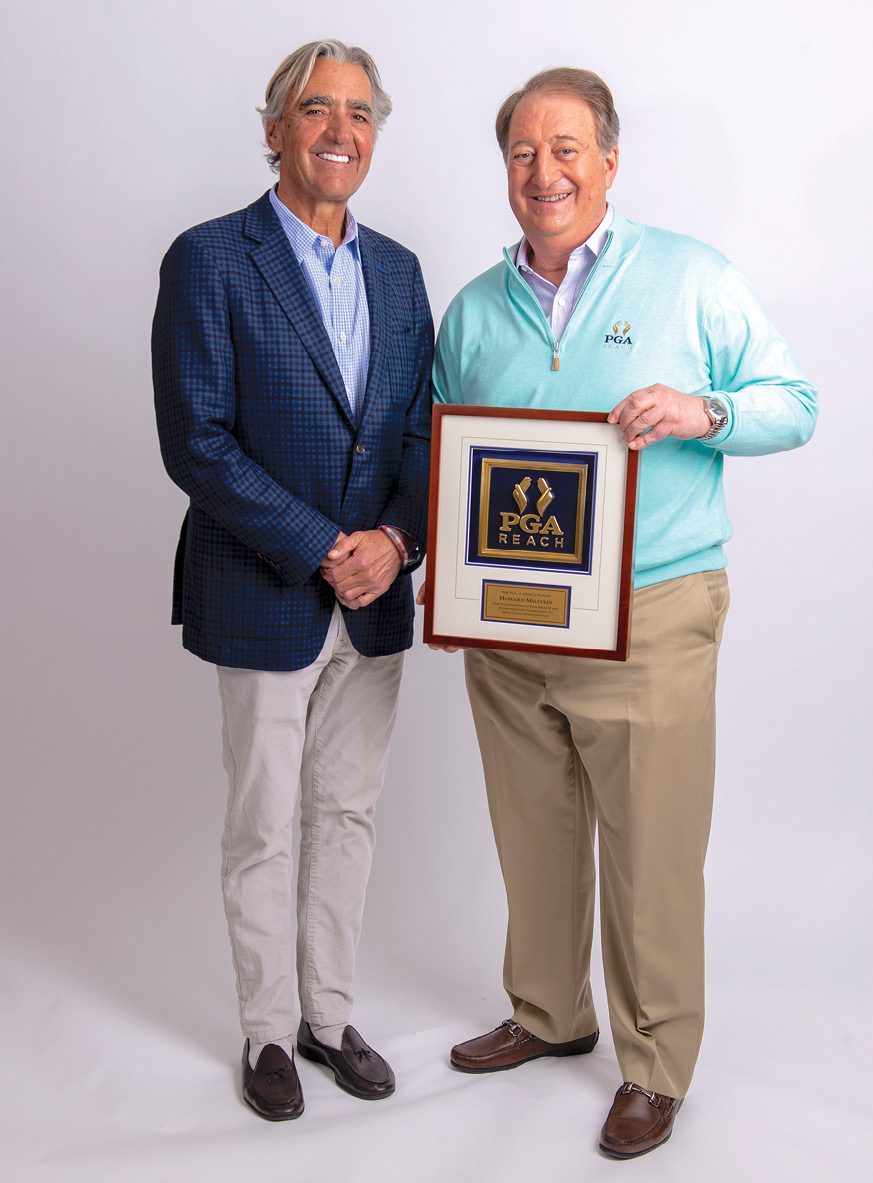- Home
- Media Kit
- Current Issue
- Past Issues
- Ad Specs-Submission
- Ad Print Settings
- Reprints (PDF)
- Photo Specifications (PDF)
- Contact Us


![]()
ONLINE

Diversity, Culture
and Education
Editors’ Note
Howard P. Milstein is the third generation to lead the Milstein family business and philanthropic activities. An entrepreneurial builder of innovative, large-scale companies, Milstein’s ability to marshal business, government, philanthropic, and family resources drives a breadth of initiatives. Milstein is Chairman and CEO of New York Private Bank & Trust, chairs and operates the Milstein family’s real estate companies, and is also owner and publisher of GOLF magazine, among other sports-related ventures. In the philanthropic arena, Milstein is a Trustee at Cornell University, an Overseer of Weill Cornell Medical College and serves on the Dean’s Advisory Board of Harvard Law School. He is Chairman of the American Skin Association, the Howard and Georgeanna Jones Foundation for Reproductive Medicine, and the Milstein Medical Asian American Partnership Foundation. Milstein also serves on the boards of the National September 11th Memorial, the Nicklaus Children’s Healthcare Foundation and PGA REACH. Milstein was named the 2008 Entrepreneur of the Year by Cornell University, and also served from 2011-2014 as Chairman of the New York State Thruway Authority, where he successfully led the design and procurement process for a new Tappan Zee Bridge – the largest infrastructure project in the nation.
Organization Brief
The Howard and Abby Milstein Foundation (howardandabbymilsteinfoundation.org) participates actively in the organizations it supports, with hands-on leadership and long-term financial support.

Howard and Abby Milstein (second and third from left)
join Henry Louis Gates Jr. (center), at the launch event for
Dr. Gates’ new PBS program Reconstruction:
America After the Civil War
Will you discuss your philanthropic areas of focus?
We look to take on some of the most challenging issues facing the world today, finding areas where we can have real impact and produce measurable change in people’s lives. We emphasize strategic gifts, institutional leadership and hands-on involvement, bringing the principles of entrepreneurship and best practices to area such as arts & culture, history, community, civic engagement, medicine and healthcare.
You have a long history supporting public television and recently became a primary sponsor of Henry Louis (Skip) Gates’ new program Reconstruction: America After the Civil War, which will air this Spring on PBS stations across the nation. Will you discuss your involvement with public television?
Sponsorship of PBS programs is a perfect example of how our targeted support can further understanding of our nation’s diverse history and its impact on community and civic life today. Reconstruction: America After the Civil War presents the definitive history of one of the least understood chapters in American history – those transformative years following the Civil War when our nation struggled to rebuild itself while making its first full attempts at equality and social change. As a friend and admirer of Skip Gates for so many years, I am constantly amazed at both his strength as a storyteller and his ability to foster crucial conversations about race, our humanity and what it means to be an American. These are themes that resonate across our nation today. In recent years, we have faced some difficult times for democracy and public discourse, and Dr. Gates’ new series is a stark reminder of how fragile our progress as a nation can be.
More broadly, a series like Reconstruction is exactly what we look for in our giving to public television. Over the years, we’ve served as primary sponsors of several landmark public television programs. In addition to Dr. Gates’ most recent program, we have also supported his previous documentary series, 2016’s Black America Since MLK: And Still I Rise, and 2013’s The African-Americans: Many Rivers to Cross, as well as other critically acclaimed PBS series such as Shakespeare Uncovered, and Simon Schama’s The Story of the Jews and the Fate of the World.

PGA of America CEO Seth Waugh with Howard Milstein
who was selected to be a trustee of PGA REACH
In December 2018, you were named a trustee and made a major donation to PGA REACH, the foundation of PGA of America. How did you begin working with PGA REACH?
For many years, I have been partners with my good friend Jack Nicklaus in the Nicklaus Companies, and Jack and I have supported a number of charities together, including St. Jude Children’s Research Hospital and the Nicklaus Children’s Healthcare Foundation. More recently, I’ve become involved in other golf-related businesses, including as publisher of GOLF magazine. Golf is a game of community, integrity, sportsmanship and managing the balance between risk and reward – principles at the heart of my own core values, whether in business or philanthropic pursuits. Thus, it was a natural fit for our mission.
Jack Nicklaus is the person who introduced me to PGA REACH several years ago, and I spent about a year working with PGA REACH and its trustees, learning about their important programs to help grow the game, seed diversity and inclusion programs, impact youth and also help our veterans become part of our community. So when I was asked to become a trustee of PGA REACH, I made a $1 million donation in honor of Jack and all of his charitable efforts over the years. I deeply believe in the game of golf and its positive impact on participants of all ages, and through this donation and my involvement as a PGA REACH trustee, I hope to give back to a community that encourages inclusion and the building of supportive relationships.
We look to take on some of the most challenging issues
facing the world today, finding areas where we can have
real impact and produce measurable change in people’s lives.
You and your family have a deep commitment to Cornell University’s Milstein Program in Technology & Humanity. What was your vision in creating this program?
For many years, we’ve had an interest in technology and its impact in furthering progress. We have also long recognized the importance of bridging the gap between a humanities education and the science and technology skills needed to succeed in the future. Along with my son, Michael, we conceived Cornell’s Milstein Program in Technology and Humanity to help build this bridge – creating a rigorous, truly distinctive experience for Cornell undergraduates in technology, while also providing a context and an ethical framework through the humanities and social sciences. Students in the program divide their time between the College of Arts & Sciences in Ithaca and Cornell Tech New York City campuses. In the Fall of 2018, we welcomed our first group of 14 Milstein Scholars – the first of 100 the program is designed to accommodate. We look forward to continued growth and success of this program in the years to come. New York has always been a city at the confluence of business, technology and the humanities. Cornell Tech is a critical ingredient in further embedding a robust tech ecosystem in New York, and we believe the Milstein program will only strengthen New York’s leadership through the contribution of these students to technology and, more importantly, to society.![]()